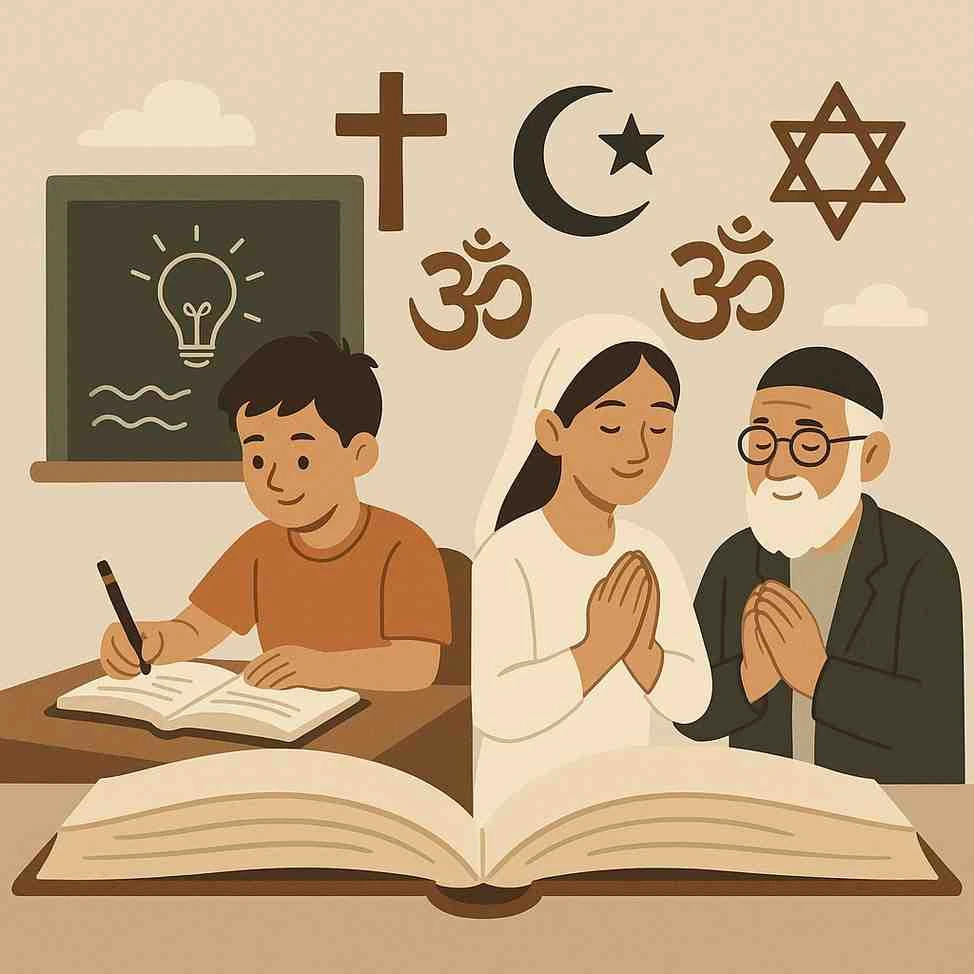The Role of Religion in Education and Moral Development
Religion has played an important role in shaping human civilization, values, and ethical behaviour for thousands of years. Across cultures and societies, educational systems have often drawn inspiration from religious teachings to develop character, discipline, and a sense of responsibility among learners. In the modern world, while formal education is mostly secular, the moral frameworks offered by religions continue to influence personal development and community life. This article explores how religion contributes to education, moral development, and ethical understanding across different traditions.
Religion and the Foundation of Moral Education
For centuries, moral education and religion have been closely connected. Almost every major world religion emphasizes principles such as compassion, honesty, respect, self-discipline, and service. These values have historically influenced how children are raised, what societies consider right or wrong, and how communities build social harmony.
Core Ethical Values Taught by Religions
Honesty and truthfulness
Compassion and kindness
Self-discipline and self-control
Respect for parents, elders, and teachers
Responsibility towards society
Integrity in thoughts, words, and actions
These values are not limited to any single faith tradition; they appear across spiritual and philosophical systems worldwide.
Historical Role of Religion in Education
Ancient India
In Vedic traditions, education (vidya) was considered a sacred duty. Gurukulas taught not only scriptures like the Vedas and Upanishads but also ethics, duty (dharma), and personal discipline. Texts such as the Bhagavad Gita highlight moral actions, devotion, and righteous behavior.
Islamic Tradition
Islamic civilization established well-known centers of learning such as Al-Azhar University in Egypt and the House of Wisdom in Baghdad. Along with mathematics, astronomy, and literature, students learned akhlaq (morality), justice, modesty, and community service—principles rooted in the Qur’an and Hadith.
Christian Monastic Schools
Many early schools in Europe were founded by Christian monks. These institutions preserved literature, philosophy, and moral teachings based on Biblical ethics such as love, forgiveness, and humility (e.g., Sermon on the Mount).
Buddhist Monasteries
Buddhist monasteries across Asia functioned as centers of holistic learning. Students studied scriptures like the Tripitaka along with meditation, mindfulness, and ethical conduct known as the Five Precepts.
Sikh and Jain Education
Sikh teachings emphasize equality, courage, honest living, and service (seva), rooted in the Guru Granth Sahib.
Jain philosophy teaches non-violence (ahimsa), truth, and discipline, which shaped educational institutions throughout Western India.
Across all traditions, education was not just about knowledge but about forming a balanced, ethical, and responsible human being.
How Religion Supports Moral Development Today
Even in secular education systems, religious principles continue to contribute to moral development in several ways:
1. Building Character and Integrity
Religious teachings often provide stories, parables, and examples of ideal behavior. For instance:
The Hindu epic Ramayana highlights duty, loyalty, and truth.
Jewish teachings emphasize justice (tzedek) and compassion.
Islamic stories of the Prophet Muhammad inspire honesty and humility.
Christian parables teach forgiveness and love.
Such narratives help students understand complex moral questions in a relatable way.
2. Encouraging Empathy and Compassion
Most religions promote empathy as a core virtue:
Buddhism teaches karuna (compassion).
Sikhism promotes sarbat da bhala (well-being of all).
Christianity teaches “love thy neighbor.”
These teachings shape emotional intelligence and interpersonal sensitivity.
3. Developing a Sense of Responsibility
Religions often emphasize accountability — to society, to creation, and to oneself.
Examples:
Islamic amanah (trustworthiness)
Hindu concept of dharma (duty)
Jain principle of aparigraha (non-possessiveness)
These ideas guide ethical decision-making in personal and social life.
4. Strengthening Social Harmony
Religious values encourage peaceful coexistence, respect for differences, and community service. Interfaith education promotes mutual understanding and reduces prejudice among students of diverse backgrounds.
5. Supporting Emotional Well-Being
Practices such as prayer, meditation, chanting, and reflection are known to reduce stress and improve clarity of mind. Many modern schools include mindfulness, inspired partly by Buddhist traditions, to support emotional development.
Religion in Modern Educational Systems
Today, education largely focuses on scientific reasoning and academic knowledge. Yet, moral education remains an important part of holistic development. Many schools integrate:
Value education
Ethics classes
Comparative religion studies
Mindfulness and yoga programs
Community service requirements
These programs aim to build qualities such as tolerance, respect, empathy, and global citizenship—values shared by many faith traditions.
Neutral and Balanced Approach
A balanced education does not promote one religion over another. Instead, it:
Encourages understanding of all traditions
Fosters respect for cultural diversity
Helps students appreciate universal human values
Builds moral reasoning based on fairness and empathy
This approach aligns with international standards for ethical and inclusive education.
Key Points to Remember
Religion has historically shaped educational systems around the world.
Major religions share universal ethical principles like honesty, compassion, and responsibility.
Religious teachings continue to support character development, empathy, and emotional well-being.
Modern schools often incorporate value-based education inspired by religious and philosophical traditions.
A balanced approach to religion in education promotes mutual respect and social harmony.
Religion continues to play a meaningful role in education and moral development, even in today’s globally connected and largely secular academic environments. While each religion has its own unique beliefs and traditions, the ethical values they promote are remarkably similar. These shared values help shape responsible citizens, compassionate leaders, and balanced individuals.
A thoughtful, neutral, and inclusive approach to religious and moral education can enrich both personal growth and societal harmony. As education evolves, integrating universal values from diverse traditions remains essential for building a just, peaceful, and ethically grounded world.
~Religion World Bureau










